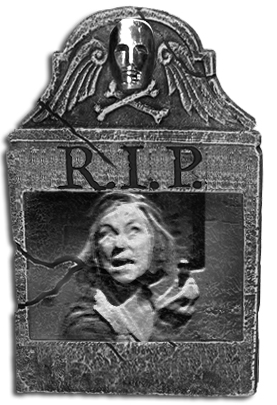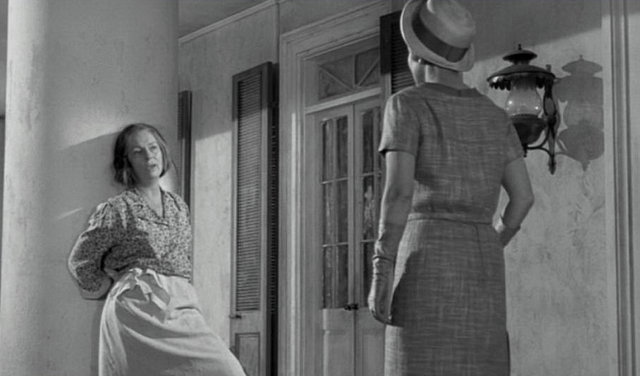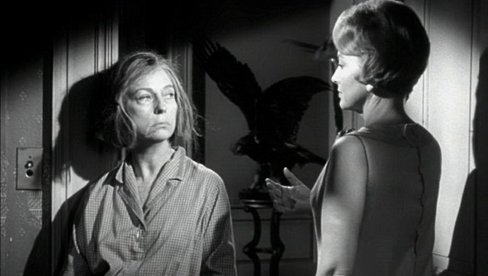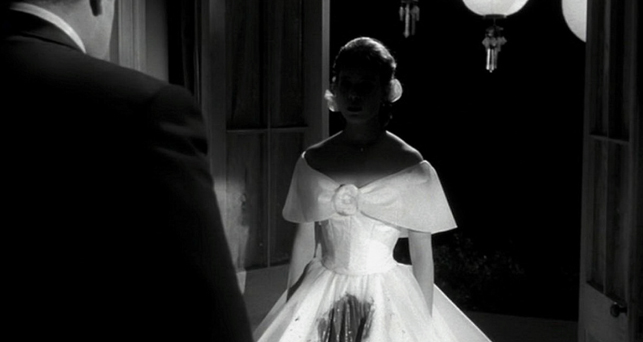Oscar Horrors: Hush Hush Campy Agnes
 Monday, October 22, 2012 at 5:24PM
Monday, October 22, 2012 at 5:24PM [ Editors Note: For today's episode of Oscar Horrors, I invited award-winning writer Manuel Muñoz ("What You See in the Dark" "The Faith Healer of Olive Avenue") to join us. I've gave all the contributors a list of every Oscar nomination from the horror genre and they chose their own subjects. -Nathaniel R.]
Editors Note: For today's episode of Oscar Horrors, I invited award-winning writer Manuel Muñoz ("What You See in the Dark" "The Faith Healer of Olive Avenue") to join us. I've gave all the contributors a list of every Oscar nomination from the horror genre and they chose their own subjects. -Nathaniel R.]
Here Lies... Agnes Moorehead in Hush...Hush, Sweet Charlotte (1964)
Hush…Hush, Sweet Charlotte is either Grand Guignol catnip or the most ridiculous Scooby Doo plot ever, depending on your level of generosity. The film lacks the sustained camp thrills of its kissing cousins What Ever Happened to Baby Jane? and Strait-Jacket. But it remains obligatory viewing, whether to fulfill your quota of the era’s is-she-crazy suspense vehicles starring Hollywood’s aging belles, or to check out Oscar offerings with peculiarly high nomination counts. Charlotte picked up seven (yes, seven) Oscar nods and while you might shrug off most of them as applause for technical show, a major Supporting Actress bid (and maybe an almost-win) came with the fourth and final invite to the big dance for Agnes Moorehead as
But first, the tawdry beginnings. Set on a once sunny Louisiana estate in 1927, the film introduces us to a young Charlotte, whose father doesn’t approve of the news he’s heard from her secret suitor. At an elaborate party (and in one of the most nimbly arranged sequences of the film), things get downright bloody, and Charlotte emerges from the shadows with one of the most conspicuously stained dresses ever to stun a crowd.
Fast forward decades later, and our fun begins.
The estate is properly rundown for our Southern Gothic purposes, the party lanterns long tattered away, and the family plot eerily within sight of the veranda. Charlotte, as played by Bette Davis, strolls around the floors of the large house with a gun and unkempt braids, possibly mad, possibly just heartbroken, but tended nonetheless by her faithful servant Velma. Threatened with eviction when a road crew comes to demolish the place, Charlotte summons her cousin Miriam (Olivia de Havilland) to help her fight city hall. But from the moment of Miriam’s arrival, we see that Velma may know more about what happened in 1927. Is she indeed the faithful servant, or is she patiently waiting for Charlotte to die so she cart off what riches she can, taking the secrets of the past with her?

Moorehead’s portrayal of Velma is intensely physical—she squats on stairs, sits splay-legged, and arches like a cat on the stairs as she picks up broken crockery. Her line delivery, for the most part, is a sort of garbled bray intended for comic effect, but it mostly tips into hammy territory. (Bette Davis isn’t much better in this department; her raised, sustained screech made me think of what might have happened to Rose if that parking-lot chase in The Golden Girls had gone on too long.) With no other characters in sight, Velma mutters and scratches her rump, shaking her head this way and that at the intrusion of Miriam and the family doctor (played by Joseph Cotten), essentially mugging with no one to witness her performance.
I’m not sure that I saw this as a miscalculation when I first saw this film in college back in the early ‘90s. But on this viewing, Moorehead’s strongest moments came in her interactions with de Havilland. Faced with the possibility that Miriam may outwit her for guardianship over the increasingly troubled Charlotte, Velma downplays her antics, both physical and vocal. What’s left is an icy desperation, an open invitation to bring it on, and the suggestive menace is delicious. And what is suggested, too, is that Velma’s slovenly ways are all an act, the character perhaps even wiser than was credited by the overall performance.

Velma’s closest twin in Academy annals is Piper Laurie’s Mrs. White in Carrie, a role I suspect is equally divisive. Loved for their camp pleasure and almost egged on by the genre itself, performances like these have almost nowhere to go but over-the-top. Yet when I think of Mrs. White, the lone scene that strikes me as implausible is her visit to Sue Snell’s mother. Preaching the Word, Mrs. White’s fanaticism comes across as ridiculous, if not harmless, simply because she has the wrong audience. Once alone with Carrie, her guarded malevolence shines through. So, too, with Velma. As the standoff becomes clearer to the audience and the stakes more vital, Velma’s anticipation of Miriam’s presence seems almost supernatural, which suits the film’s mood. In a crucial moment when an important telephone call is interrupted, Velma hardly turns her head to acknowledge that she has heard Miriam enter the room, and all credit is due to Moorehead for lending the exchange its thick, combative air.
A nomination (but not a win) for this performance feels just about right, since I struggle to see how a win could have stacked up against some of the best in the category (like Ruth Gordon in Rosemary’s Baby or Cloris Leachman in The Last Picture Show), or even some of the best also-rans (like Judith Anderson in Rebecca or Maureen Stapleton in Interiors). Without giving away too much more, Velma is essentially a stock role, familiar to us from suspense pictures of all stripes, baity in its excess, yet best in its more cunning, later exchanges. My viewing of Hush…Hush, Sweet Charlotte brought easy associations with a surprising array of films, from Blue Velvet to Volver, The Others to Psycho, and even the full-on gorefest of Creepshow. (Don’t trust my associations though: for some reason, I thought about Airport when I went to see Beasts of the Southern Wild, which bewildered everyone when we sat around for a drink afterwards). In any case, if Aggie isn’t to your taste, maybe Mary Astor—in a brief slip of a performance that would make Vanessa Redgrave salivate over the possibilities—could be the next name you toss out at the party when the call goes out for unheralded performances that could have swiped a second Oscar.




Reader Comments (11)
Agnes Moorehead is one of the Supporting Actresses par excellence. Together with Thelma Ritter, she is my all-time favorite. It is truly a pity that she never managed to get that elusive Oscar. Call it timing, call it what you will, but it's a bloody shame!
1942: The Magnificent Ambersons is heralded by many as her more worthy performance, and I tend to agree. This is my theory: There were two other very, very strong performances: Gladys Cooper for Now, Voyager, and the sweet Dame May Whitty for Mrs Miniver. Maybe their votes split three-ways in such a way that Teresa Wright ended up with the jackpot. She had the advantage of being nominated both as an Actress (Pride of the Yankees) and as Supporting Actress (for Mrs Miniver). I personally would have given it to Gladys Cooper.
1944: Moorehead's performance in Mrs Skeffington was worthy of a nomination but not the award, which rightfully went to Ethel Barrymore for "None But the Lonely Heart".
1948: This must have been a neck-and-neck race to the finish between Moorehead for Johnny Belinda and Claire Trevor for Key Largo. No complaints here, though I would like to revisit both performances.
1964: Moorehead was again pitted against Gladys Cooper for her role in everyone’s favorite My Fair Lady. Agnes was absolutely great in Charlotte, and I would have given her the Oscar, but strictly speaking Lila Kedrova –who won for Zorba the Greek– was a force to be reckoned with. Dame Edith Evans in The Chalk Garden and Grayson Hall for The Night of the Iguana must have divided the waters a little. I can imagine Agnes and Gladys leaving the theatre and Agnes saying: “Gladys, my darling, we were robbed.” I stick to a Moorehead victory, but I must admit there may be an Oscars-in-retrospect twist to my conviction.
I loved reading this but I haven't seen the movie . Must rectify
Any gay men or gay adjacent 60somethings reading? Please tell me that that stained dress was a Halloween hit that year.
I also have yet to see this, and since What Ever Happened to Baby Jane is a favorite, I'm sure I'll at least like it. That Agnes Moorehead is there to chew whatever scenery she can get her bloody teeth on is only one more reason to put it at the top of my "Must Watch" list.
I also have to say that "What You See In The Dark" is in my bag waiting for me to start reading it on the train ride home. I can't wait!
denny -- yes! Glad to hear it. do tell me what you think of it. As a PSYCHO obsessive I find it so compelling but even if it were a less beloved movie as background Manuel is "The Faith Healer of Olive Avenue" has some amazing short stories in it...
Wha...? How is this possible you haven't seen Charlotte? Mary Astor will be an even bigger treat. The Viola Davis/Beatrice Straight/Hermione Baddeley of 1964.
Maddening when you think of some of the people who do have Oscars, Zellweger comes to mind, and then great actresses like Agnes, Thelma Ritter and Ida Lupino, who was never even nominated, who were passed over time and again.
I think of her nominated performances Ambersons is without question the most deserving but she gave so many great performances. I've always been most fond of her venal turn in Dark Passage where she does what she did best, be a total bitch. But her warm work in The Big Street & Mrs. Parkington and brittle, thoughtless hoarder in Since You Went Away are also terrific. She appeared in a lot of junk as well as some fine films as most of the golden age actors and actresses did but she almost always, there is a performance or two in the mix where she really goes over the top, improved any film she was in.
Her character in Charlotte is nomination worthy and it would have been nice to see her win although I don't know if hers was the best performance of that year not that that has ever stopped the academy. Mary Astor was another of those great character actors who could do wonderful things with very little but at least she was awarded once and had quite a tenure as a leading lady/star.
Heck, she never even won an Emmy for playing Endora in Bewitched though I think she was nominated pretty much every year it was on the air. Oh well, always a bridesmaid. Time to play "the glad game?" ;-)
Dave: She was Emmy nominated six years in a row for Bewitched, but didn't win. However, she won as a Supporting Actress in a Drama for Jim West in1967. That year she had received two nominations. The thing with Bewitched and the Emmy is that she was sometimes submitted as leading actress, where she competed against her co-star Montgomery, and lost to Lucille Ball and Susan St. James. As Supporting Actress she lost to Valerie Harper, Karen Valentine and, strangely enough, to her Bewitched co-stars Alice Pearce and Marion Lorne.
She won two Golden Globes, for Mrs. Parkington and Charlotte. Add to that a NYFCC award for The Magnificent Ambersons. She missed on the Oscar four times, but it's not a bad record after all.
Season 2, Ep 15 of The Twilight Zone features Aggie in "The Invaders": a wordless wonder if you've got about 25 minutes and Netflix.
Charlotte is such a great entertainment. Bette is terrific in this, just shy of an Oscar nom. And thank you for the nods to Mrs. Parkington, a superior, gorgeously appointed melodrama boasting a spectacular Oscar-nominated turn by the luminous Greer Garson.